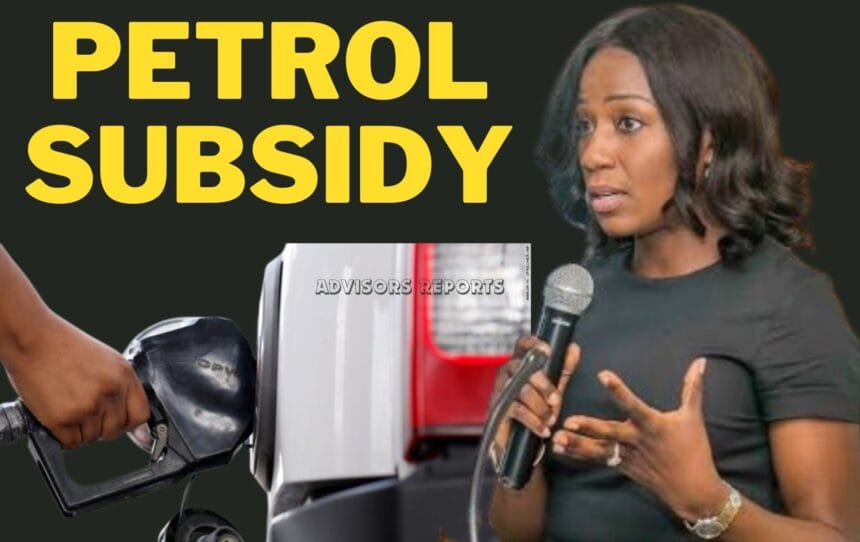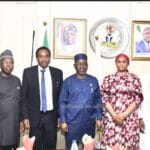…says action is global norm to ease economic burden on citizens
Oredola Adeola
Mrs. Olu Veŕheijen, Special Adviser to President Bola Tinubu on Energy, has revealed that the Federal Government retains the authority to intervene through subsidy in the pricing of Premium Motor Spirit (petrol) to alleviate the impact on citizens.
During a press briefing in Abuja on Friday, Mrs. Veŕheijen addressed questions by journalists regarding the government’s stance on fuel subsidy amidst circulating claims.
According to her, the subsidy was removed on May 29, 2023, however, the government has the prerogative to maintain price stability to address social unrest. They reserve the right to intervene.
“If the government feels that it cannot continue to allow prices to fluctuate due to high inflation and exchange rates, the government reserves the right to intervene intermittently and that, does not negate the fact that subsidy has been removed,” the Special Adviser to the President said.
She said, “It started in the United States during COVID-19 period. There were a lot of expansionist moves but there were subsidies on certain commodities.
“All governments deserve that right. And if for whatever reason the administration has reviewed that it is not the right time to have prices continue to fluctuate given the level of hardship in the country, given inflation, the government has the right to intervene intermittently.
“All governments do so but it does not take away the fact that the subsidy was removed,” Veŕheijen said.
Amidst growing speculations surrounding the government’s covert subsidization of petrol, recent revelations from prominent sources have shed light on the disparity in petrol pricing within a deregulated downstream sector like Nigeria.
Reports indicate that the actual petrol price landing cost stands at N1,424 per litre, contrasting sharply with the N568 per liter at NNPC retail outlets and N623 per liter at some independent stations.
While these discrepancies raise questions about the underlying mechanisms in the fuel pricing structure, the Nigerian National Petroleum Company Limited (NNPCL) has maintained a conspicuous silence regarding the speculated return of subsidy.
Notably, there has been no official statement from the Federal Government to either confirm or refute these speculations, leaving room for further scrutiny and analysis within the energy sector.
Robert Dickerman, the Managing Director/Chief Executive Officer of Pinnacle Oil and Gas Ltd, disclosed during an exclusive interview with Advisors Reports at the just concluded Nigeria Downstream Forum and Nigeria International Energy Summit (NIES 2024) that the government is currently disbursing a substantial N1 trillion monthly as a petrol subsidy to mitigate economic challenges.
According to him, there remains a substantial subsidy on petrol, particularly in the Foreign Exchange component of the commodity’s price in Nigeria.
“This subsidy structure, distinct from the global dollar price, has resulted in significantly lower petrol prices within Nigeria compared to neighboring countries. Consequently, this disparity has inadvertently fueled smuggling activities and strained the Nigerian economy amidst ongoing challenges,” Dickerman said.
He emphasised that the cost is hurting the entire budget of the Federal and State government as critical programmes cannot be funded to pay this subsidy. It is currently calculated to be about N1 trillion per month.
Dickerman however challenged the NNPCL to open up about the intricate details of this substantial subsidy.
He therefore noted that ceasing subsidy payments would result in no petrol supply, if there are no refineries producing gasoline.
Pinnacle Oil and Gas Ltd MD further claimed that the government is intervening significantly below the global price of petrol in dollars, thereby fostering smuggling to neighbouring African countries amidst economic challenges.
He said, “All supplies of petrol come from the international market which only sells at market prices.
The MD/CEO of Pinnacle Oil and Gas Ltd emphasised that there is no competition in bulk supply, because the Nigerian National Petroleum Company Limited (NNPCL) owned by the government is only organisation that can import because of the foreign exchange crisis.
He said, “Wholesale and retail prices are set based upon their subsidized cost, and they (NNPCL) determine who gets supply.
“Without a competitive market, foreign investors are discouraged from investing in this sector in Nigeria,” the MD Pinnacle said.
He also revealed that the government is discreetly subsidizing the price of petrol to prevent potential political turmoil stemming from fuel price hikes and consequent inflation.
Dickerman said, “Of course, the subsidy on petrol is a palliative intended to help Nigerians. But the help is minimal, as petrol is a small percentage of personal budgets, while the damage to the national economy is massive.
“The surrounding countries have shut down their own refineries because of the flood of cheap and subsidized Nigerian petrol.
The MD/CEO of Pinnacle Oil underscored his commitment to Nigeria’s economic prosperity by advocating for prudent policies.
With a fervent focus on preventing a potential government debt default that could halt worker payments, the CEO’s call for sensible measures aims to secure the nation’s financial stability.
In a recent report, the International Monetary Fund (IMF) disclosed that the Nigerian government has reintroduced petroleum subsidies through indirect means.
The IMF further projected that Nigeria could face an expenditure of approximately N7 trillion, equivalent to 3% of GDP, if the current fuel pump price cap and electricity subsidy are maintained throughout 2024.




